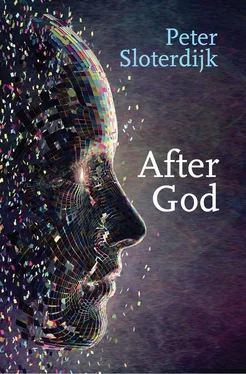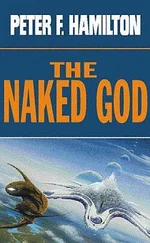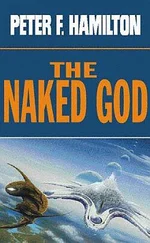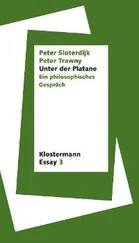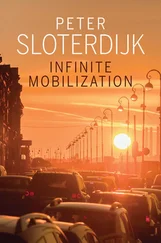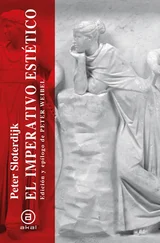Nevertheless, in some of the dramas about the titan Prometheus attributed to the poet Aeschylus, we can glimpse the anticipation of a post-Olympian state of affairs. By virtue of his farsighted intelligence, Prometheus is thought to have looked beyond the regime of Zeus. Legend has it that he offered to share his menacing visions with Zeus if the latter would free him from his eternal torment on the rock in the Caucasus. Zeus – obviously quite far from being omniscient when it came to his own affairs – is supposed to have entered into the deal and “unbound” Prometheus. He did this in order to find out whether a virtual son of his could threaten him with the same fate that he had prepared for his own father Cronus when he, Zeus, emasculated him while Cronus was having sex with Gaia. Zeus subsequently refrained from producing a son capable of imitating his father. He relinquished the spicy nymph who was standing by as the possible mother of his murderer.
Up to this point, the premonitions of unrest in the houses of the gods remain confined to dynastic phase changes. Without further ado, the Greeks of the classical centuries could imagine a palace coup in the Olympian realm; a twilight of the gods in the Indo-Germanic or Nordic style is foreign to their temperament. The Stoic doctrine of ekpurōsis (world conflagration) is a later exoticism imported from the Middle East.
Germanic mythology gives us more fecund material for approaching the question of the sort of event that the “twilight of the gods” is. Admittedly, up to the present day scholars have had various reasons to debate whether the poets of the gods in Old Norse had already thought up the idea of a consuming fire at the end of times independently, or whether it was exposure to Christian apocalypticism that gave them an understanding of what it means to take an interest in downfall.
Let us remember that the idea of Ragnarök – a word sometimes translated as “the end of the world” and sometimes as “twilight of the gods” – was ushered in at a time of genealogical deregulations. In the wake of these deregulations, brothers strike one another dead, fathers strangle their sons, and parents sexually abuse their offspring. Something similar happens at the cosmological level. The giant wolf Fenris swallows the sun and moon, and the stars vanish. After a winter of a thousand days when the summer can no longer fulfill its task of separating one winter from next, the earth shakes, mountains topple, the ocean floods the mainland, the world tree trembles, and everything alive is filled with dread. In the final battle between the Muspelheim gods and the archaic monsters, Thor dies from the poison of the giant snake he kills, while the wolf swallows Odin. The battle comes under the law of an almost certain mutual annihilation. Finally, Surtr (“the Black,” Vulcan’s Scandinavian counterpart) sets the world aflame and burns down everything that exists. The only survivors to emerge from the inferno are a few gods and a human couple. It will be their task to establish a new cycle of life.
There is no reason here to delve into analogies between Ragnarök and the Mahabharata or the Apocalypse of John. Nor are we worried whether the word Götterdämmerung [twilight of the gods] is a correct translation of Ragnarök . According to the scholarly literature, Ragnarök covers a wide range of meanings, which extend from “death of the gods” to “renewal of divine forces.” Even Richard Wagner appears not to have been entirely convinced of the adequacy of the expression. According to a report by Cosima, 12while he was working on the fourth part of The Ring of the Nibelung , he played with the idea of calling the piece Göttergericht [ Court of the gods ], “for Brünnhilde holds court over them” (i.e. the gods). Thus at issue for the composer who inaugurated the renaissance of the “twilight of the gods” motif 13was not so much a myth of downfall in Nordic garb as the corrective to an ethical mistake that had long ago woven itself into the fabric of the world. His Götterdämmerung is a moral drama of purification; it is not intended as a phenomenology of spirit for the stage. It recognizes no original sin – just an original mistake. There is ingenious symbolism in the fact that the logs from the fallen world tree make Wagner’s location for the gods, Valhalla, go up in flames. The finale of the stage performance exceeds all proportions. It is as though the profane fragmentation of the world’s organism into pieces of wood were the spiritual and material cause for the dying down of the gods.
The twilight of the gods on stage reveals a marked pessimism. Wagner’s libretto puts up with the fact that the old gods have become metaphysically worn out. Seen from a cultural perspective, even Brünnhilde’s sublime suicide is no more valuable than Emma Bovary’s. A certain anarchic vandalism has the last word. There is no talk of a new cycle of creation. The “estrus of downfall” 14seizes everything. The reasons for this cannot be found in the work of art itself.
We can invoke Richard Wagner’s contribution to the portrayal of the agony of the gods as evidence of the fact that the freedom of the will migrated to the domain of art some time ago. In today’s turbulent world, the human being can experience a trace of freedom, that is, an openness toward what is to come, only by drawing on his “own” creative potential – and on that of his companions who share in the same fate. There is an epochal significance in the immigration of creativity to the realms of art and technology. Without this immigration, the word “modernity” would be mere sound and fury. The first thinker of Europe, Giambattista Vico, conceptualized this movement by distinguishing the age of the gods from the epoch of heroes and from that of human beings. This sequence can be rewritten as a progressive incarnation. Where there were gods, human beings should come to be. Where there are human beings, artificiality increases.
Wagner’s work is so philosophically remarkable because it brings these three spheres very close to one another. It evokes a demanding near simultaneity of gods, heroes, and human beings. Wagner’s meditation on the power of time can be seen in how he presents the heroes after the gods and the human beings after the heroes – without offering any further justification for this sequence. Wagner’s new mythology is a hermeneutics of fate. It purports to make us understand by means of pure presentation. Matters of fate can only be shown, not explained. Fate refers to what happens without allowing any questions as to why.
From the perspective of philosophy, Wagner is not just chronologically situated between Hegel and Heidegger. As a reader of Feuerbach, he knows that human beings have an innate god-making ability. As a reader of Schopenhauer, he understands that action incurs debt from blind will. As a reader of Bakunin, it is clear to him that whoever wants something new must lay his torch on what is flammable, that is, on what the critical spirits call the “existent.” No purification without passing through the fire. No phoenix without ashes.
The Götterdämmerung constitutes evidence of Wagner’s insight that the old set of gods has become obsolete. They “are able only to watch this ending approach and do nothing to prevent it.” 15At the same time, Wagner’s speculations only provide an indirect contribution to our understanding of the process that, with regard to ontology, can be called translatio creativitatis [transfer of creativity]. This expression refers to the fact that it is not only God who is a creator; nature and human beings have creative qualities too. There are obviously a multiplicity of creativities and a multiplicity of reflexivities in the world that a divine authority cannot reclaim, let alone monopolize. The earth is a place of polyvalent intelligence. It forms the only known point in the universe where one can really say: there is thinking, in manifold ways.
Читать дальше
